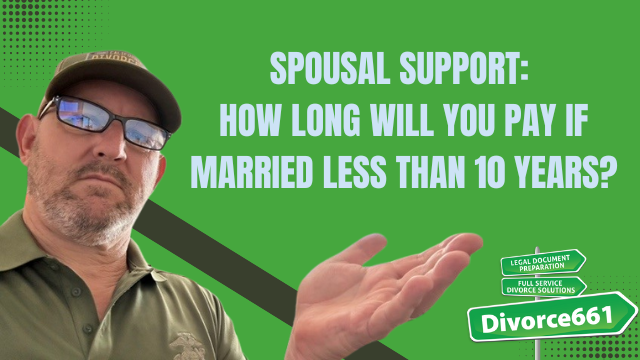Spousal Support: How Long Will You Pay If Married Less Than 10 Years?
Understanding the duration of spousal support payments can be a complex and often emotional topic during divorce proceedings. If your marriage lasted less than 10 years, you might wonder how long you could be obligated to provide financial support. In this article, we break down the general guidelines regarding spousal support duration, based on insights from Tim Blankenship of Divorce661.
What Determines the Length of Spousal Support?
Spousal support, sometimes called alimony, is designed to help the lower-earning spouse maintain a reasonable standard of living after divorce. The duration of these payments often depends on the length of the marriage as well as other factors like income disparity, age, and the recipient’s ability to become self-supporting.
Key Rule for Marriages Under 10 Years
For marriages that lasted less than 10 years, a common guideline is that spousal support will typically last for about half the length of the marriage. This means if you were married for 8 years, the support might continue for approximately 4 years following the divorce.
“For marriage less than 10 years, support will last half the length of the marriage.”
This rule reflects the idea that shorter marriages usually involve less financial entanglement and dependency, so support obligations are correspondingly shorter. However, keep in mind this is a general guideline and courts can adjust the duration based on specific circumstances.
Why Does Duration Matter?
Knowing how long spousal support may last helps both parties plan for the future. It provides a framework for budgeting and financial independence. For the paying spouse, it sets expectations on how long the financial commitment will continue. For the receiving spouse, it offers a timeline to work toward self-sufficiency.
Factors That Influence Spousal Support Duration
- Length of Marriage: As mentioned, shorter marriages typically result in shorter support duration.
- Financial Need and Ability to Pay: Courts assess the paying spouse’s ability and the recipient’s financial needs.
- Recipient’s Employment Potential: If the recipient can quickly re-enter the workforce or improve earning capacity, support duration might be shorter.
- Age and Health: Older or disabled spouses may receive longer support.
- Contributions During Marriage: Non-financial contributions, such as homemaking or child-rearing, are also considered.
Conclusion
If you were married for less than 10 years, expect that spousal support will generally last about half the length of your marriage. This guideline provides a balanced approach, recognizing the financial interdependence developed during the marriage while encouraging eventual financial independence for both parties.
Understanding these basics is crucial when navigating divorce and spousal support issues. For personalized advice, consulting with a family law professional is always recommended.
Special thanks to Tim Blankenship of Divorce661 for sharing this clear and concise rule of thumb on spousal support duration.

